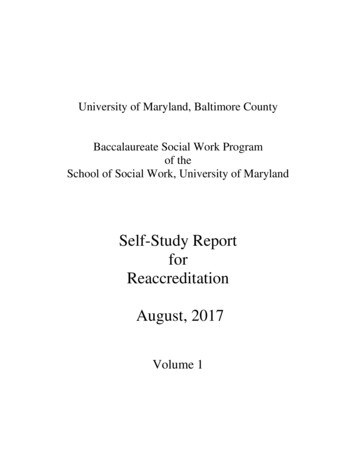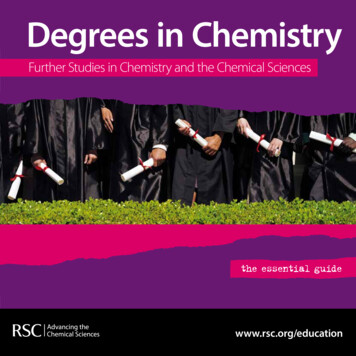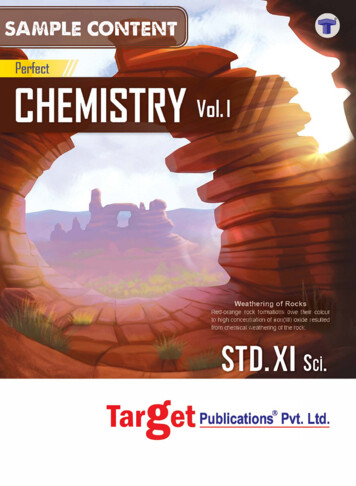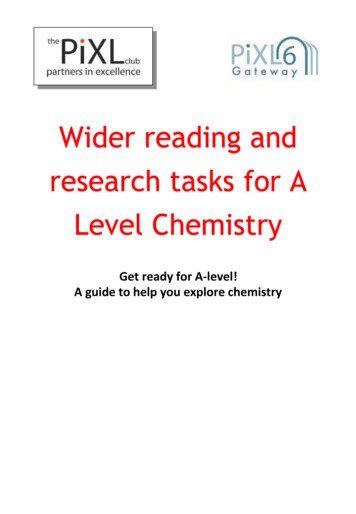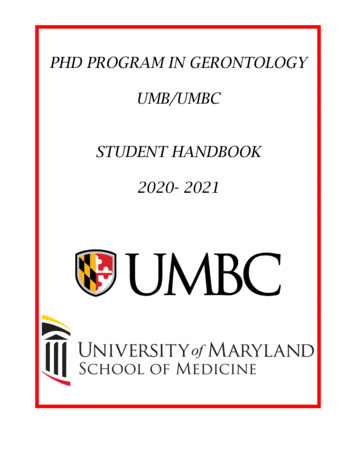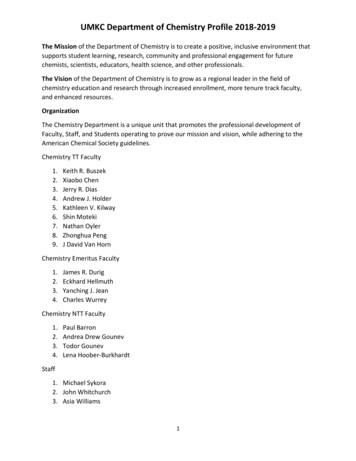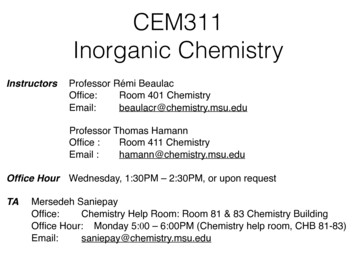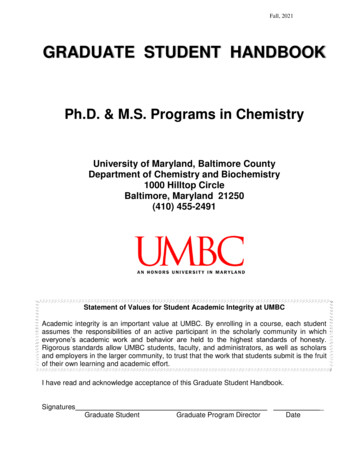
Transcription
Fall, 2021GRADUATE STUDENT HANDBOOKPh.D. & M.S. Programs in ChemistryUniversity of Maryland, Baltimore CountyDepartment of Chemistry and Biochemistry1000 Hilltop CircleBaltimore, Maryland 21250(410) 455-2491Statement of Values for Student Academic Integrity at UMBCAcademic integrity is an important value at UMBC. By enrolling in a course, each studentassumes the responsibilities of an active participant in the scholarly community in whicheveryone’s academic work and behavior are held to the highest standards of honesty.Rigorous standards allow UMBC students, faculty, and administrators, as well as scholarsand employers in the larger community, to trust that the work that students submit is the fruitof their own learning and academic effort.I have read and acknowledge acceptance of this Graduate Student Handbook.SignaturesGraduate StudentGraduate Program DirectorDate
TABLE OF CONTENTSImportant Contact Information . 4Departmental Administration & Faculty . 5Departmental Instructors . 6Departmental Staff . 7Expectations & Graduate School Requirements . 8Admission Requirements . 9Programs, Committees and Advisements . 10Chemistry Ph.D. Program . 11Stages of Progression . 11Table I. The Progression Milestones for a Ph.D. Degree . 11Stage 1: Completion of Course Requirements & CHEM 690 . 12(a) Placement Examinations . 12(b) Coursework: Common Core Courses in the First Year . 12(c) Departmental Seminar . 13(d) Research Rotation and Choosing an Advisor . 13(e) CHEM 690 Seminar during the Second Semester. 14(f) Completion of Additional Coursework Requirements. 14(g) Teaching Requirement . 15Stage 2: Literature Review . 15(a) Appointment of Dissertation Committee . 15(b) Completion of Literature Review Requirement . 16Stage 3: Advancement to Candidacy. 16Stage 4: Original Research Proposal. 172
TABLE OF CONTENTS (Cont.)Stage 5: Final Dissertation Defense . 18(a) Residency Requirement . 18(b) Appointment of Final Dissertation Defense Committee . 18Ph.D. Progression Checklist and the Required Forms to be Completed . 20Chemistry M.S. Program (Thesis Option) . 21Table II. Progression Milestones for an M.S. Degree with Thesis Option . 21(a) Coursework . 21(b) Research . 22(c) Appointment of Examination Committee and the Final Thesis Defense 22M.S. (Thesis) Progression Checklist and the Required Forms to be Completed . 23Chemistry M.S. Program (Non-Thesis Option). 24Table III. Progression Milestones for an M.S. Degree with Non-Thesis Option . 24(a) Coursework . 24(b) Research Experience . 25M.S. (Non-Thesis) Progression Checklist and the Required Forms to be Completed . 26Teaching Assistantship Responsibilities. 27Title IX Responsibilities . 28Semesterly Responsibilities . 29Yearly Responsibilities . 29Policy and Procedures for Student Academic Misconduct . 30APPENDIX - The Required Departmental and Graduate School Forms . 353
IMPORTANT CONTACT INFORMATIONEmergencyCampus Police(410) 455-5555 (on campus: Ext. 55555)Chemistry Department Administration and FacilitiesBrian Moravec, Manager, Administration & FacilitiesDepartmental needs, keys, equipment, academic and non-academic scheduling(410)-455-2522 (on campus: Ext. 52522),UMBC Graduate School2nd floor, Administration Building(410) 455-2538Graduate Student Association (GSA)Commons Building, Room 308(410) 455-2773UMBC Registrar’s OfficeSherman Hall B-wing, 2nd Floor(410) 455-3158Financial ServicesStudent Billing Services3rd Floor, Administration Building(410) 455-2288UMBC GA Health Insurance / University Health ServicesErickson Hall(410) 455-1556UMBC Counseling Centerwww.umbc.edu/counseling(410) 455-2472UMBC Career Services CenterMath/Psychology Bldg., room 212(410) 455-2216UMBC International Education Serviceshttps://ies.umbc.edu/UMBC LGBT Resource esource-PamphletPDF2.pdf4
DEPARTMENTAL ADMINISTRATION & FACULTYChair -Cullum, Brian, ProfessorGraduate Program Director -Daniel, Marie-Christine, Associate ProfessorDirector of Admissions -Ptaszek, Marcin, Associate ProfessorTeaching Assistantship Coordinator -Smith, Paul J., Associate ProfessorFaculty by Specific Research AreasFor individual faculty research, see Departmental Website: http://chemistry.umbc.edu/Analytical, Inorganic, and Physical ChemistryArnold, Bradley R., Associate ProfessorBennett, Joseph, Assistant ProfessorChen, Chengpeng, Assistant ProfessorCullum, Brian M., Associate ProfessorDaniel, Marie-Christine, Associate ProfessorGeddes, Christopher, Professor & Director, Institute of FluorescenceKelly, Lisa A., Associate ProfessorKoirala, Deepak, Assistant ProfessorKyoung, Minjoung, Associate ProfessorLaCourse, William R., ProfessorLiebman, Joel F., ProfessorPtaszek, Marcin, Associate ProfessorRosenzweig, Zeev, Professor and ChairSmith, Aaron T., Assistant ProfessorSummers, Michael F., Professor & Investigator, Howard Hughes Medical InstituteBiochemistryAn, Songon, Associate ProfessorChen, Chengpeng, Assistant ProfessorKoirala, Deepak, Assistant ProfessorKyoung, Minjoung, Associate ProfessorLu, Wuyuan, Associate ProfessorRosenzweig, Zeev, Professor and ChairSmith, Aaron T., Assistant ProfessorSummers, Michael F., Professor & Investigator, Howard Hughes Medical InstituteOrganic ChemistryDaniel, Marie-Christine, Associate ProfessorLiebman, Joel F., ProfessorPtaszek, Marcin, Associate ProfessorSeley, Katherine, ProfessorSmith, Paul J., Associate Professor5
DEPARTMENTAL INSTRUCTORSThe instructors in the department play a critical role in undergraduate education. They arecommitted to full-time teaching, including lectures and/or supervision of associated laboratorysessions.Senior LecturersCarpenter, Tara- General and Analytical ChemistryGierasch, Tiffany- Tutorial Center Director and Organic ChemistryPerks, Mark- Organic ChemistryTracy, Allison- Biochemistry LaboratoryLecturerJohnstone, Chariz- General Organic and Biochemistry IHamilton, Diana- Collaborative Learning LaboratoryVan Staveren, Marie- Analytical and Physical ChemistryLaboratories6
DEPARTMENTAL STAFFThe staff is a dedicated team of professionals that provide vital functions to the department and itsmissions. As graduate students, you will have the opportunity to interact with them to assist you.Departmental Administration and FacilitiesBrian Moravec, Manager, Chemistry room 108, Ext. 52522, departmental needs, keys,equipment, academic and non-academic schedulingGraduate Program CoordinationPatty Gagne, Program Management Specialist for Chemistry Graduate Program, Chemistryroom 106, Ext. 52491Chemistry OfficeMichele Mullins, Office Supervisor, Chemistry room 104, Ext. 52505, assistant to Chair,general office administration, backup for payroll, web site dutiesRamona Patel, Administrative Assistant, Chemistry Main Office, room 100, Ext. 52491,office receptionist, general office administrationPayrollWilliam DeVilbiss, Business Manager, Chemistry room 101, Ext. 55962, financial reportingJane Henderson, General Assistant, University Center room 116, Ext. 58059, payrollservicesPurchasing and SuppliesCreighton Smith, Chemistry Stockroom Manager, Chemistry room 254, Ext. 52515,chemical suppliesDepartmental ServicesTony Baney, Glassblower, Chemistry room 277, Ext. 52966, provides glassware fordepartmentJosh Wilhide, Chemistry room 006, Ext. 52815, MCAC facilityUMBC MME Technical Service Center:Tim Buckheit – Micro-fabrication, Buckheit@umbc.eduJohn Cataldi – Machining, jcdc@umbc.eduNikolai Galitsky – Electronics, Galitsky@umbc.eduLaboratory CoordinatorFrank Tyminski, Laboratory Supervisor, Chemistry room 564, Ext. 52552, laboratorycoordination7
EXPECTATIONSWhat does it mean to be a graduate student?“Being a graduate student means wanting to be the first in the world to learn something new that noone has ever known or seen before. To accomplish this you will learn to think and solve complicatedproblems with little or no guidance, as the obstacles that you will encounter in your research and yourfuture will be ones that no one has ever seen before and no defined methods exist for approachingthem. It will be your experience with current research methods and your ability to approach anddetermine a logical path to address previously unanswered problems that will be the legacy of yourgraduate education. This ability to approach the unknown and determine the best means by which tolearn more about it is the ultimate meaning of a Ph.D. in the sciences.”Dr. Brian Cullum“Being a graduate student is an exciting opportunity to learn and practice scientific research on cuttingedge problems of critical significance. It is all accomplished via apprenticeship working under a mentorthat has dedicated his or her life to add a sentence or two to the body of scientific knowledge. As ateam, you will discover new molecular worlds in the bottom of flask or from the signal of a detector.The adventure that you partake of is a journey of the mind and in the heart.”Dr. William LaCourseGRADUATE SCHOOL REQUIREMENTSStudents are expected to familiarize themselves with all the requirements of theGraduate School of the University of Maryland as described in the Graduate School bulletin.Graduate School Academic Integrity y/Graduate School Policies, Procedures, /Degree Requirements and qs/Graduate Tuition and Fees:http://gradschool.umbc.edu/funding/tuition/8
ADMISSIONS REQUIREMENTSUndergraduate Course Requirements Completed a Bachelor's Degreeo A major in Chemistry or Biochemistry (expected) Preferred undergraduate background includes courses in organic and physical chemistry,physics, calculus, and some work in the biochemical sciences. Applications will be welcomed from students with degrees in other fields, providing theirrecords indicate potential ability to complete the program successfully.o A minimum of an overall "B" (3.0) grade point average (GPA) If a prospective student's overall undergraduate GPA is less than "B". Provisional admittance may be granted by the Graduate Admissions Committee. Any deficiencies in the student’s background must:obe completed within one or two semesters after admissiononot adversely affect the student's ability to handle the graduate programobe completed after the student enters the program either by additional coursework orby a comprehensive examinationoGraduate credit will not be allowed for those courses taken to complete therequirements for admission to the program.Letters of Recommendation Three (3) letters of recommendation with at least two from instructors involved withthe student applicant during the student's tenure in a previous academic program.Examinations Required Graduate Record Examination (GRE) Verbal, Quantitative, and Analytical AptitudeTests are required and the Advanced Chemistry Test is recommended. Test of English as a Foreign Language (TOEFL) Examination.o Foreign students are expected to obtain a score of 550 or above for the paperbased test, or 80 or above for the internet-based test.Program Interest All prospective students are required to provide a statement (ca. one typewrittenpage) describing their interests and reason for pursuing the M.S. or Ph.D. degree.NOTE: The Graduate Record Examination, along with transcripts and recommendations, are intended toprovide the Department with as much background information as possible to help evaluate the student'squalifications for entry into the program.9
PROGRAMS, COMMITTEES AND ADVISEMENTSSummer Bridge ProgramThis program is intended to assist the incoming new graduate students in a smooth transitionto UMBC. When offered, all entering Ph.D. and M.S. students who opt to participate in theSummer Bridge program will be assigned to the Director of the Summer Bridge Program foradvisement. The Director will assist the student in adjusting to the academic and socialsettings of UMBC, follow the student’s progress in the Summer Bridge coursework.Faculty Advisor for Incoming StudentsThe Graduate Program Director serves as the Faculty Advisor for all entering Ph.D. andM.S. students, by assisting them in the selection of courses. This role of Faculty Advisoris only temporary until the student selects a permanent research advisor to carry out his/her dissertation/thesis research.Research MentorThe research mentor or advisor guides his or her research trainee in their professionaldevelopment over the duration of their dissertation/thesis research. The mentor will assist inthe selection of courses, learning and practicing the scientific method, and preparing thestudent for a lifelong career in their chosen discipline.DEGREE PROGRAMS:Ph.D., M.S.10
Ph.D. ProgramThe Ph.D. program in Chemistry allows students to concentrate in Biochemistry, OrganicChemistry, Analytical, Inorganic or Physical Chemistry. There are five stages of academicprogression toward successful completion of the Ph.D. degree as shown below:Stages of Progression1. Completion of Course Requirements, CHEM 690 Seminar, and Choosing an Advisor2. Literature Review3. Candidacy Exam4. Independent Research Proposal5. Dissertation DefenseThe above stages of progression and the timeline for completion of each are shown belowin a tabular form for easy reference. The detailed descriptions of each stage follow the table.Table I: The Progression Milestones for a Ph. D. DegreeYear12345SemesterActivities1Core Courses CHEM 714 Lab Rotations (CHEM 602)Core/Elective Courses CHEM 690 CHEM 714 Choosing an Advisor23Appointment of Committee Members Literature Review (CHEM 720) Additional Elective Courses4CHEM 600 Research (CHEM 898)5Advancement to Candidacy Research (CHEM 898)6Research in Progress (CHEM 899)78910Research in Progress (CHEM 899) Independent Research ProposalResearch in Progress (CHEM 899) Final Dissertation Defense11
Stage 1: Completion of Course and Teaching Requirements& CHEM 690 Seminar(a) Placement ExaminationsAll incoming students are required to take placement examinations in order to assist inchoosing coursework during the first year of graduate studies for specifically addressing anindividual student’s course needs. Placement examinations in undergraduate organic and physical chemistry.o Placement examinations are given immediately prior to a student’s enteringsemester, during the Orientation Week. Course waivers in other core course areas.o Any student may petition the Graduate Committee to place out of core courses dueto successful completion of similar courses at other institutions or by examination(Placement examination or other). This petition must be submitted to the GraduateCommittee no later than the student’s first semester of study. Based upon the scores of placement examinations, the studento May be exempted from the appropriate core courses.o May be instructed to enroll in the core course.o May be asked to take remedial undergraduate courses (CHEM 601) to bedetermined by the Graduate Committee. A grade of "B" or better must be obtained for any remedial course work takenor risk dismissal from the program.(b) Coursework: Common Core Courses in the First YearStudents are recommended to concentrate on core courses during the first year. Thesecourses are selected with the guidance of your temporary Faculty Advisor. Studentssupported by teaching or research assistantships generally take two courses per semester inaddition to the Seminar, and Rotation. These courses are to be taken for grade and not P/For audit, and dropping or withdrawing from a course without prior consent by the ChemistryGraduate Program Director is not permitted.All graduate students, whether master’s or doctoral, must successfully completethree (3) out of five basic core courses:12
o Chemical and Statistical Thermodynamics, CHEM 611o Inorganic Chemistry, CHEM 605o Comprehensive Biochemistry I, CHEM 437 (Students concentrating inBiochemistry must enroll in CHEM 437 as part of the three core requirements)o eticMethodologies, CHEM 654.o Advanced Analytical Methods, CHEM 667.(c) Departmental Seminar/Ethics rrentChemical/Biochemical Research, both Fall and Spring semesters. This course willentail weekly departmental seminars on current research in chemistry/biochemistry byexperts in combination with discussions of critical ethical topics to researchers. Thecombined course format of seminar and ethics will allow graduate students to applywhat they have learned in ethics discussions to potential case studies (both theoreticaland those from current research efforts presented in seminars). All first year students are required to attend the seminars even if they are not formallyenrolled in CHEM 714 (which could happen should the sum of a semester’s credits oftwo courses plus CHEM 602 or CHEM 690 equal or exceed 10 credits). Only students with a Teaching Assignment conflict will be allowed to defer enrollmentin CHEM 714 to the following semester. Attendance on all non-conflict days is stillrequired.(d) Research Rotation and Choosing an AdvisorDuring the Fall semester, each student will become familiar with various research programsin the Department, and is expected to speak to at least three faculty members about theirresearch. The student, in consultation and consent by the concerned faculty member, will selecta laboratory in which he/she will do a research rotation of 8 weeks, to be initiatedin the first semester. After completion of the first rotation, the student is encouragedto do one or two additional research rotations in other labs depending upon theindividual interest and need.13
All students will enroll in CHEM 602 (1 credit), Introduction to Laboratory Research,during their first semester, to account for one of their research rotations.o The selection of a dissertation advisor is based upon mutual consent between theconcerned student and the faculty member, and upon the approval of the Chair ofthe department.o The advisor selection must be completed no later than the end of the secondsemester into the graduate program, or you will be switched to the Non-ThesisM.S. program.(e) CHEM 690 Seminar during the Second SemesterAll students must register for CHEM 690, a required seminar course, and give an oralpresentation to the Department during the second semester of study in the graduate program.The topic for the seminar should not be related to the actual graduate research if the studenthas already chosen an advisor, and must be approved by the faculty member in charge of thecourse for that semester. The students will be evaluated for their Presentation Skills,Organizational Ability, In-depth Exploration and Critical Assessment of the Topic. Studentswho fail may be given a second chance to repeat the presentation with the same or a differenttopic in the following semester, but failure beyond the second attempt will require a new topicfor presentation. In any case, no more than three attempts may be granted for passing thiscourse requirement.(f) Completion of Additional Coursework RequirementsIn addition to fulfilling the three core course requirements, the students enrolled in the doctoralprogram must complete the following advanced course requirements.Three (3) additional 600 level courses (9 credits; excluding 600, 601, 602, 690, 714 orresearch credit courses) chosen with the approval of the research advisor and student’sDissertation Committee, if applicable.o Students concentrating in Biochemistry must enroll in CHEM 638 as one of theelectives.o Students in the CBI program may substitute a suitable (as deemed CBI by thestudent’s mentor) advanced biology, biochemistry or chemical/biochemicalengineering course at the 600- level for a chemistry elective course requirement.o All students must also register for CHEM 600 (Advanced Laboratory Project) for 214
credits during the fourth semester of study in the graduate program.o Eighteen (18) credits of CHEM 899, Dissertation Research, after the student hasbeen admitted to candidacy. All students performing doctoral research, but who arenot yet admitted to candidacy, must instead enroll in CHEM 898, Pre-CandidacyDoctoral Research.(g) Teaching RequirementsTwo (2) semesters of teaching is required of all Ph.D. candidates.oThis requirement may take the form of lectures, laboratory supervision,demonstration, tutorial assistance, and grading of examinations and term papers.The teaching requirement may be satisfied at any time during a student’s tenure.However, it will be normally accomplished prior to the end of the third (3rd) year.Exceptions can be made by petition to the graduate committee.Stage 2: Literature Review(a) Appointment of Dissertation CommitteeAfter completion of the core courses and CHEM 690 seminar, the Dissertation Committee willbe appointed by the student’s Research Advisor by the end of the third semester in order tomonitor the progress of the student at each level starting from Stage 2 (Literature Review).The same committee can also serve as the Final Dissertation Defense Committee afterofficially being appointed as such by the Dean of the Graduate School at or close to the timeof graduation (see below). The committee will normally consist of a total of five facultymembers, three of whom, including the Advisor, are from the student’s own Division (Thethree divisions in the Department include Organic Chemistry, Biochemistry and the combinedInorganic/Physical/ Analytical Chemistry), one of whom is from outside the Division, and onefrom outside the Chemistry Program whether from within or external to the University. Themembers of this committee are appointed by the student’s Research15
Advisor. In order to best monitor the student’s progress toward Ph.D. degree, the committeemembership shall be kept constant until graduation, if at all possible.(b) Completion of Literature Review RequirementAll Ph.D. students must enroll in CHEM 720, Critical assessment of the Scientific Literature,during their third semester of graduate studies. This is an oral presentation of a thoroughliterature review on the topic of dissertation research. This requirement must be completedby the end of the third semester into the graduate program. This is a closed meeting withmembers of the dissertation committee, including the Advisor, who chairs the committee. Thecandidate must submit a brief written report on the research topic to each member of thecommittee two weeks in advance of the examination. The report should state, in 5 doublespaced pages or less (not including references), the specific aims, significance, and themethods involved. Although there is no page limit for the number of references to be listed, itis expected that the student has a good familiarity with any reference that is included. Thecandidate is expected to demonstrate in-depth background knowledge of the field of his/herdissertation research.The Research Advisor will report the results in writing to the Graduate Program Director orthe Graduate Program Coordinator, and will give a grade (P/F/I) for CHEM 720 at the end ofthe semester. In case of unsatisfactory performance, the Committee may recommend (a) asecond chance for the candidate to pass the oral examination, within a specified time limit,(b) transfer of the candidate to the M.S. program, or (c) termination from the graduateprogram.Stage 3: Advancement to CandidacyThis is a closed oral examination of the candidate with the Dissertation Committeefor assessment of his/her proficiency in conducting the dissertation research. TheResearch Advisor participates in conducting the candidacy examination by chairing thecommittee. The first attempt at this exam should take place before the end of the fifthsemester in the program and must be successfully completed by the end of third year ofgraduate study. At least two weeks before the examination, the candidate must submit tothe Committee a written text of 20 double-spaced pages or less, not including references,on the dissertation research. The text will consist of the specific aims, significance,16
preliminary results, as well as future experiments to be conducted toward completion of thedissertation. An appendix containing material in support of the inference, analysis andconclusions presented in the text may be included. Such material could include, butnot be limited to, details of experimental procedures involved, analytical, kinetic, andspectroscopic data collected, charts and graphs that are pertinent to the experimentsperformed, etc. The appendix material is not subject to the page limit.The Research Advisor will report the results in writing to the Graduate Program Directoror Graduate Program Coordinator. Under normal circumstances, the Committeemembership will remain the same as the original Dissertation Committee describedearlier. In case of unsatisfactory performance, the Committee may recommend (a) asecond chance for the candidate to pass the oral examination, within a specified timelimit, (b) transfer of the candidate to the M.S. program, or (c) termination from thegraduate program.Stage 4: Original Research ProposalThis requirement is to assess the proficiency of the candidate to perform creative,independent research.The goal is to give the candidate the opportunity to show thats/he can develop a research project based on his/her own original idea.The ideashould be related to the field/expertise that the candidate gained during his/her Ph.D.studies but differ from his/her advisor's work.This exercise also allow for thecandidate to get feedback from each committee member on his/her own researchproposal.This requirement is to be completed only after the student has acquiredsufficient skills to conduct dissertation research with minimal supervision. Thisrequirement could be completed subsequent to advancement to candidacy but itshould not be any later than 3 months prior to the final dissertation defense. Thesubject of the proposal would presumably be in the realm of the student’s scientific andexperimental/theoretical expertise. Topics that are the subject of ongoing research in theAdvisor’s, and their collaborators, group(s) would not be considered acceptable topics.The specific format to be followed for the research proposal may also vary and thecandidate must first discuss expectations with the Advisor. These expectations will becommunicated by the Advisor to, and approved by the Dissertation Committee.17
Minimally, the proposal should contain sections including Introduction, Specific Aims,Background, Research Plan, Expected Results and Discussion of possible pitfalls andremedies. The minimum number of pages will be stipulated by the Advisor but the maximumnumber of pages should not exceed 15 double-spaced pages. Proposals of 10-15 pageswould be considered the norm. Complete references are to be included and are exclusive ofthe minimum/maximum proposal pages stipulated above. The student should provide a copyof the Original Research Proposal Evaluation Form (see Appendix to this Handbook for allthe necessary forms) to each member of the Dissertation Committee. This includes theAdvisor, who normally acts
Math/Psychology Bldg., room 212 (410) 455-2216 UMBC International Education Services . The Graduate Program Director serves as the Faculty Advisor for all entering Ph.D. and M.S. students, by assisting them in the selection of courses. . University of Maryland Graduate School, Baltimore
